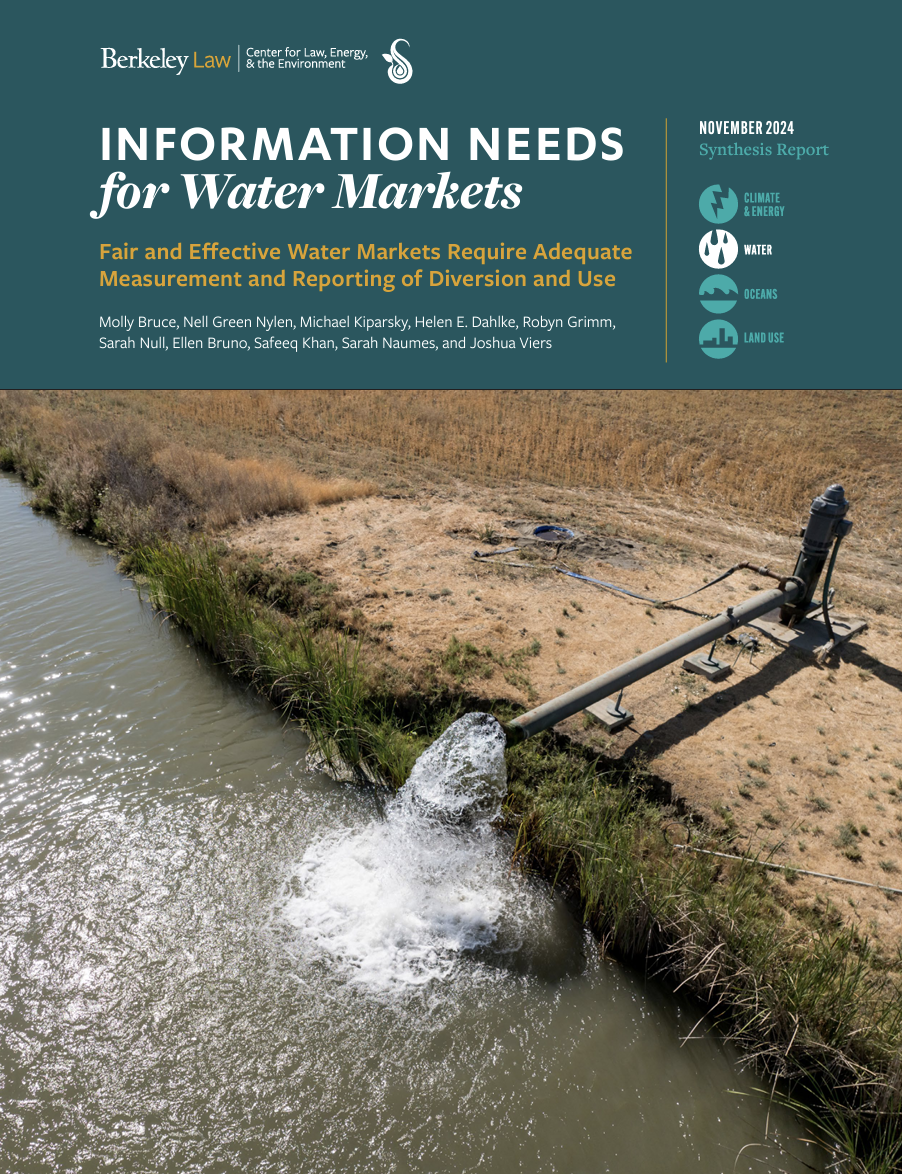The Center for Law, Energy & the Environment (CLEE) believes solving our most pressing environmental challenges requires actionable research, training, and engagement to accelerate the implementation of solutions.
Our Mission:
CLEE tackles climate change and other environmental challenges at the local to global scale through the development and implementation of equitable and effective legal and policy solutions. Our expert staff leverages the world’s leading public research university to engage community leaders, government, business, and other stakeholders; to lead timely and practical research initiatives; and to train leaders to take action on our most pressing environmental problems.
Our Values:
- Pragmatism: CLEE focuses on answering “how” questions and implementing timely and practical climate and environmental solutions
- Collaboration: CLEE convenes policymakers, stakeholders, and other interested parties to tackle complex problems
- Integration: CLEE builds expert multidisciplinary teams to solve problems
- Equity: CLEE is committed to representing and including diverse perspectives to design and implement equitable solutions
- Experience: CLEE’s experienced team of government leaders and experts brings invaluable practical knowledge to our work
In the News
Recent Publications
A record of all CLEE reports is available here.
Regulating Data Center Water Use in California
February 2026
 AI is driving a boom in data centers, and with it growing demands on California’s water resources. Developers are building more data centers alongside the hundreds already operating in California. Servers in data centers generate heat and typically use water for cooling, and concern over data center water use is growing.
AI is driving a boom in data centers, and with it growing demands on California’s water resources. Developers are building more data centers alongside the hundreds already operating in California. Servers in data centers generate heat and typically use water for cooling, and concern over data center water use is growing.
To respond to this growing challenge, our team reviewed current knowledge on data center water use, mapped the policy and regulatory framework for direct data center water use in California, and developed recommendations.
Learn more and read the report: Regulating Data Center Water Use in California
January 2026
 As policymakers seek to stabilize housing prices and improve home ownership opportunities of all types by increasing supply, where are the best locations and optimal new construction housing types that will provide the least-cost and most affordable similarly situated homes for homebuyers? To address this question, CLEE, with support from The Nature Conservancy (TNC) and technical support from Economic & Planning Systems, Inc. (EPS), selected three case study geographies to assess the differences in the cost of home ownership in California.
As policymakers seek to stabilize housing prices and improve home ownership opportunities of all types by increasing supply, where are the best locations and optimal new construction housing types that will provide the least-cost and most affordable similarly situated homes for homebuyers? To address this question, CLEE, with support from The Nature Conservancy (TNC) and technical support from Economic & Planning Systems, Inc. (EPS), selected three case study geographies to assess the differences in the cost of home ownership in California.
Learn more in the full report: Affording the California Dream: Optimal Locations and Product Types to Increase Home Ownership Opportunities
Yale Law Journal: The Uninsurable Future
December 2025
Dave Jones, Director of CLEE’s Climate Risk Initiative and former California Insurance Commissioner, published an essay in the Yale Law Journal outlining the climate change-driven crisis facing the US insurance industry, with increasingly extreme catastrophes leading to coverage withdrawals, premium increases, and long-term destabilization of the market. Jones analyzes recent regulatory responses in California and Florida before proposing a suite of reforms in state insurance regulation, land use reforms, federal reinsurance for residual markets/FAIR Plans, and requiring insurers to transition from investments in and writing insurance for the fossil fuel industry: “The only long-term solution to preserve an insurable future is to transition from fossil fuels and other greenhouse-gas-emitting industries.”
Read the essay: “The Uninsurable Future: The Climate Threat to Property Insurance, and How to Stop It“
Navigating the Growing Prospects and Growing Pains of Managed Aquifer Recharge
November 2025
Increasing water demands and declining groundwater levels have led to rising interest in managed aquifer recharge. Managed aquifer recharges can reduce water-supply challenges and provide environmental benefits, but also comes with growing pains. As the article explains, there also are potential solutions to these challenges, and the future success of managed aquifer recharge will likely depend on the extent to which these solutions are adopted.
Read the open-access article: “Navigating the Growing Prospects and Growing Pains of Managed Aquifer Recharge“
Driving Demand: Solutions to Increase the Market for Heavy-Duty Zero-Emission Vehicles
December 2025
 Medium- and heavy-duty trucks are major contributors to greenhouse gas emissions and air pollution. Yet California’s policies to phase out fossil fuel-powered trucks in favor of zero-emission models have been undermined by recent federal actions, including a congressional vote to terminate California’s mandate on truck makers to produce zero-emission models and a rollback of many federal tax incentives for these vehicles.
Medium- and heavy-duty trucks are major contributors to greenhouse gas emissions and air pollution. Yet California’s policies to phase out fossil fuel-powered trucks in favor of zero-emission models have been undermined by recent federal actions, including a congressional vote to terminate California’s mandate on truck makers to produce zero-emission models and a rollback of many federal tax incentives for these vehicles.
To identify new state policies to increase demand for zero-emission trucks, CLEE and the UCLA Law Emmett Institute on Climate Change and the Environment released a new report offering recommendations for policymakers and industry leaders.
Access the full report here: Driving Demand: Solutions To Increase The Market for Heavy-Duty Zero-Emission Vehicles
Snapshot: CLEE 2025 Annual Report
November 2025
 This year, we faced unprecedented challenges – increasing climate disasters on a global scale, efforts to dismantle environmental protections, rollbacks in federal funding, and threats to the rule of law.
This year, we faced unprecedented challenges – increasing climate disasters on a global scale, efforts to dismantle environmental protections, rollbacks in federal funding, and threats to the rule of law.
Amidst these challenges, CLEE’s mission remains vital. Our commitment to a sustainable, equitable future is unwavering. We continue to cultivate local and subnational partnerships, strengthen communities and infrastructure, and equip the next generation of environmental leaders to navigate our changing climate.
Your partnership has been instrumental in our success, and we are grateful for the opportunity to share our impact.
Read this year’s annual report: CLEE Snapshot 2025 Annual Report
Costs of Climate Change: Financial and Economic Impacts on California and U.S. Households
September 2025
The costs of climate change are enormous and affect every sector of the economy. Increasing temperatures, extreme events, and other climate-related disruptions affect energy consumption, health and lead to increased costs for households and businesses.
CLEE’s report summarizes available research on how climate change is affecting costs to U.S. and California households and businesses. The report authors want to thank Next 10 for their support and partnership on this project.
Access the full report: Costs of Climate Change: Financial Impacts on California and U.S. Households
Mapping California State Investments in Climate and Communities
 September 2025
September 2025
As part of its climate initiatives, California has implemented a number of community-supporting programs. These state programs present a much-needed opportunity to enhance equity in clean energy projects by augmenting and strengthening the state’s “soft” (or civic) infrastructure, which in turn can bolster project durability and success.
CLEE’s report summarizes existing soft infrastructure that has already been created through select state investments in climate mitigation and equity-driven capacity building and technical assistance, and catalogues specific projects funded by these state investments in the North and Central Coasts of California. These state investments, if synergized, present an opportunity to create stronger soft infrastructure and ensure that new climate infrastructure projects are developed in a durable, but also an equitable and sustainable, way.
Access the full report: Mapping California State Investments in Climate and Communities
Zero-Emission Trucks: A Factsheet Series
August 2025
 This factsheet series is intended to help address some of the most common questions related to zero-emission trucks and the supply-side regulations that can accelerate their deployment. The Center for Law, Energy and the Environment (CLEE) researched and developed these factsheets to provide a comprehensive overview of the market, technology, and policy considerations driving the critical shift in the transportation sector.
This factsheet series is intended to help address some of the most common questions related to zero-emission trucks and the supply-side regulations that can accelerate their deployment. The Center for Law, Energy and the Environment (CLEE) researched and developed these factsheets to provide a comprehensive overview of the market, technology, and policy considerations driving the critical shift in the transportation sector.
Access the factsheet series: Zero-Emission Trucks: A Factsheet Series
July 2025
 As climate impacts continue to worsen, transformative investments are required in both climate mitigation and adaptation-related infrastructure projects. The vast scale of investment needed and limitations in existing funding and financing channels require innovative approaches to generating capital for climate-related infrastructure. This report explores three investment models for their capacity to finance infrastructure for EV charging, offshore wind, and direct air capture.
As climate impacts continue to worsen, transformative investments are required in both climate mitigation and adaptation-related infrastructure projects. The vast scale of investment needed and limitations in existing funding and financing channels require innovative approaches to generating capital for climate-related infrastructure. This report explores three investment models for their capacity to finance infrastructure for EV charging, offshore wind, and direct air capture.
Access the full report here: Investment Models for Climate Infrastructure Implementation
Zero-Emission Hydrogen and Aviation in California: Opportunities, Challenges, and Policy Needs
May 2025
Zero-emission hydrogen produced in California could help reduce carbon emissions and air pollution from aviation, as well as support energy resilience. Produced from carbon-free electricity, this hydrogen has the potential to fuel airport ground operations and aircrafts, either as an ingredient for carbon-neutral liquid fuels or to power fuel cells for zero-emission aircraft.
To explore hydrogen’s broader role in aviation, CLEE, along with San Francisco International Airport (SFO) and RMI, co-chaired the Aviation Working Group for the federally funded ARCHES (Alliance for Renewable Clean Hydrogen Energy Systems). The working group developed an Aviation White Paper that maps out a path forward for both the short- and long-term future of hydrogen in California’s aviation sector.
Learn more from the Aviation White Paper.

May 2025
Multibenefit projects like levee realignments that reconnect floodplains can provide benefits for both people and nature. They can address climate adaptation, water management and ecosystem restoration at the same time. However, funding these projects can be challenging, because funding sources usually support single-purpose projects.
To understand how this plays out in practice, we studied a flood risk management project in California’s Pajaro Valley. We explored how the project was funded, including its successes and challenges, and formulated lessons learned and recommendations with broader application.
Download the article.
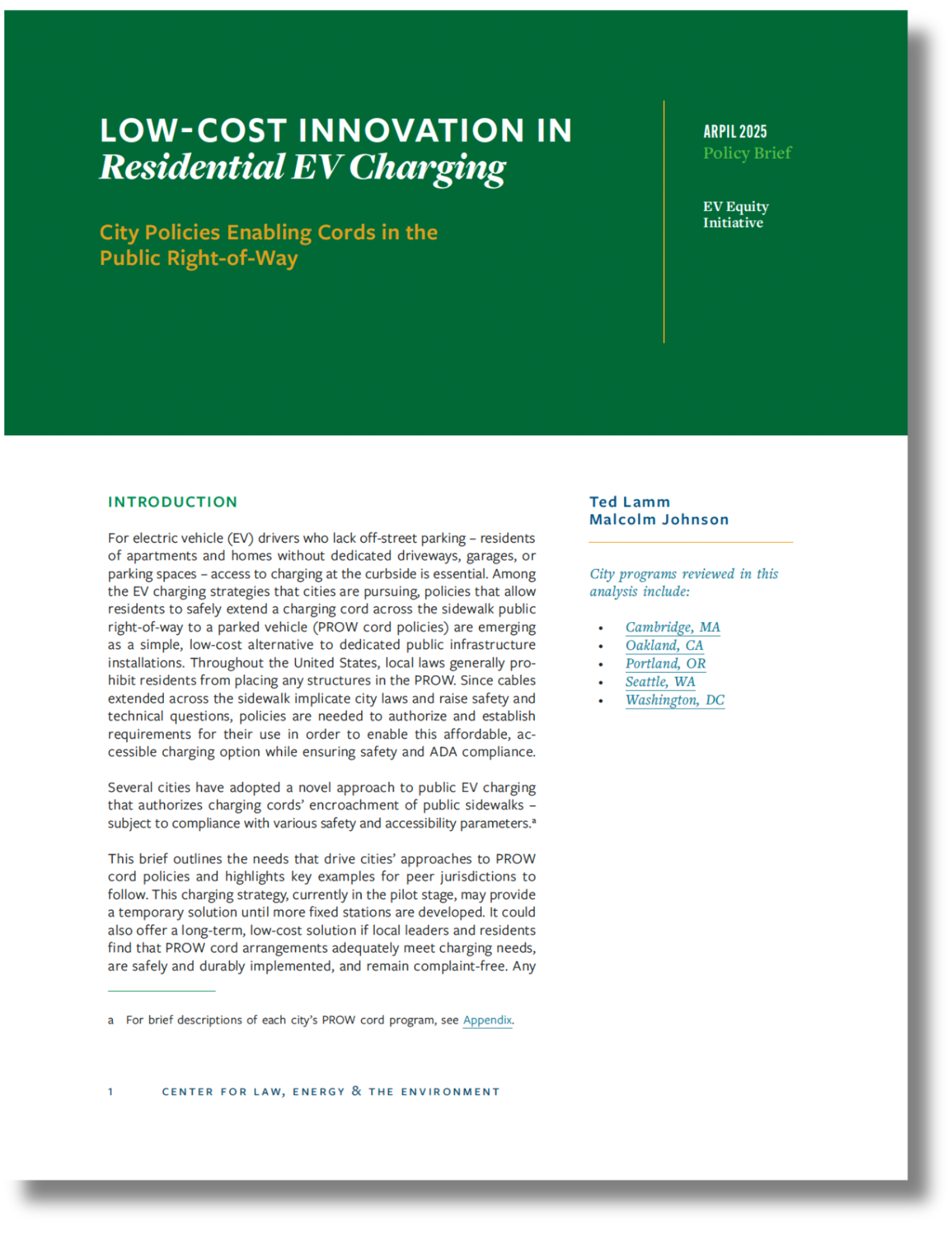 April 2025
April 2025
As EV drivers increasingly run their charging cords across the public right-of-way (PROW) to fulfill basic charging needs, affirmative policies are needed to authorize this convenient and affordable charging option. With support from CLEE, Oakland became the fifth US city (and first in California) to institute its own PROW cord policy. CLEE’s policy brief describes PROW cord policies then compares and contrasts their adoption in five different cities.
Read the full policy brief: Low-Cost Innovation in Residential EV Charging: City Policies Enabling Cords in the Public Right-of-Way
A Cost-Effective, Fast, and Sustainable Fire Recovery in Los Angeles
 April 2025
April 2025
The Los Angeles wildfires in January 2025 resulted in significant infrastructure losses, highlighting the need for an urgent, cost-effective, and sustainable recovery effort in the fire-impacted communities of the Pacific Palisades and Altadena. Both commercial and residential buildings in Los Angeles have historically been built to a dual-fuel standard, with both electricity and natural gas used to support building appliances, water heating, and cooking functions. As the state of California moves toward a clean energy transition, this report provides an initial scoping exercise into the potential costs, speed, safety, and sustainability issues associated with rebuilding the fire-impacted communities in Los Angeles to an all-electric standard vs. a dual-fuel approach.
Read the full report: A Cost-Effective, Fast, and Sustainable Fire Recovery in Los Angeles
State and Local Financing to Advance Sustainable Groundwater Management
April 2025
The Sustainable Groundwater Management Act (SGMA) requires local Groundwater Sustainability Agencies (GSAs) to develop Plans for how they will achieve long-term sustainability. California’s Department of Water Resources (DWR) is required to evaluate whether Plans “substantially comply” with SGMA’s requirements. Adequate financing is a crucial ingredient for local groundwater management. However, establishing new sources of revenue and repurposing existing ones is not easy, and indeed is something GSAs have struggled with in the past. Proactively developing financing plans will help GSAs avoid funding-related failures.
This issue brief, More state and local attention to financing can advance sustainable groundwater management, examines how well GSAs have addressed this need and assesses DWR’s process for reviewing this criteria. Our results indicate that (1) there are many opportunities for GSAs to improve the quality of their attention to financing and (2) DWR has authority to exercise more effective oversight.
Read the issue brief: More state and local attention to financing can advance sustainable groundwater management
Hunting Methane Using Satellites: A Guide for Policymakers
 April 2025
April 2025
Methane is a powerful greenhouse gas, over 80 times more potent than carbon dioxide in the short term. Reducing methane emissions is one of the fastest ways to slow global warming, but tracking sources and enforcing reductions has long been a challenge—until now. Thanks to a new generation of space-based instruments, satellites can detect methane leaks in real time, offering unprecedented transparency and accountability.
Our new report explains how policymakers can harness satellite data to improve climate policies, enforce emissions regulations, and accelerate methane reduction efforts. It provides a roadmap for integrating these technologies into decision-making, offering practical recommendations for governments, regulators, and industry leaders.
Read the full report: Hunting Methane Using Satellites: A Guide for Policymakers
First Ever Wildfire Resilience Insurance Policy Written and Placed
April 2025
The Nature Conservancy (TNC) and Willis, a business of Willis Towers Watson (NASDAQ:WTW), along with Berkeley Law’s Center for Law, Energy & the Environment (CLEE), announced today a first-of-its-kind insurance policy that takes into account nature-based efforts to mitigate fire risk. Structured by Willis, the $2.5 million wildfire resilience insurance coverage has been developed for Tahoe Donner Association (Tahoe Donner), a private homeowners association in Truckee, California. The insurance is underwritten by Globe Underwriting, an internationally recognized insurer.
In collaboration with CLEE’s Climate Risk Initiative, the wildfire resilience insurance policy was developed and placed to demonstrate lower premium pricing and improved availability where ecological forest practices have taken place. Such techniques include tree thinning to improve the health and growth of the remaining trees and planned fires to clear out flammable vegetation, both proven to reduce wildfire risk and make forests healthier. Tahoe Donner was selected as the customer for the wildfire resilience insurance policy due to its cutting-edge Forest Health Management Program, which began in 1992 and evolved from efforts to create a healthy forest to mitigating climate and wildfire impacts.
Learn more about this innovative project here from the Technical Report and Press Release.
Mapping Community Benefits Plans
March 2025
Nearly all projects funded by the Bipartisan Infrastructure (BIL) and Inflation Reduction Act (IRA) required submission or preparation of a Community Benefits Plan (CBP), which have the potential to deliver meaningful benefits to host communities. The ultimate date of these CBPs is murky due to Trump Administration Executive Orders and ongoing litigation. Working with a Berkeley Law student, CLEE is hosting a map that displays information on 635 of these CBPs. We will be working with students to track these projects over the coming months and will share updates.
Learn more about the project here.
If students are interested in volunteering to assist with data analysis and tracking for community benefits, please reach out to CLEE at clee-law@berkeley.edu.
State of Aviation Decarbonization: State Policy to Regulate Carbon Emissions from Aviation
March 2025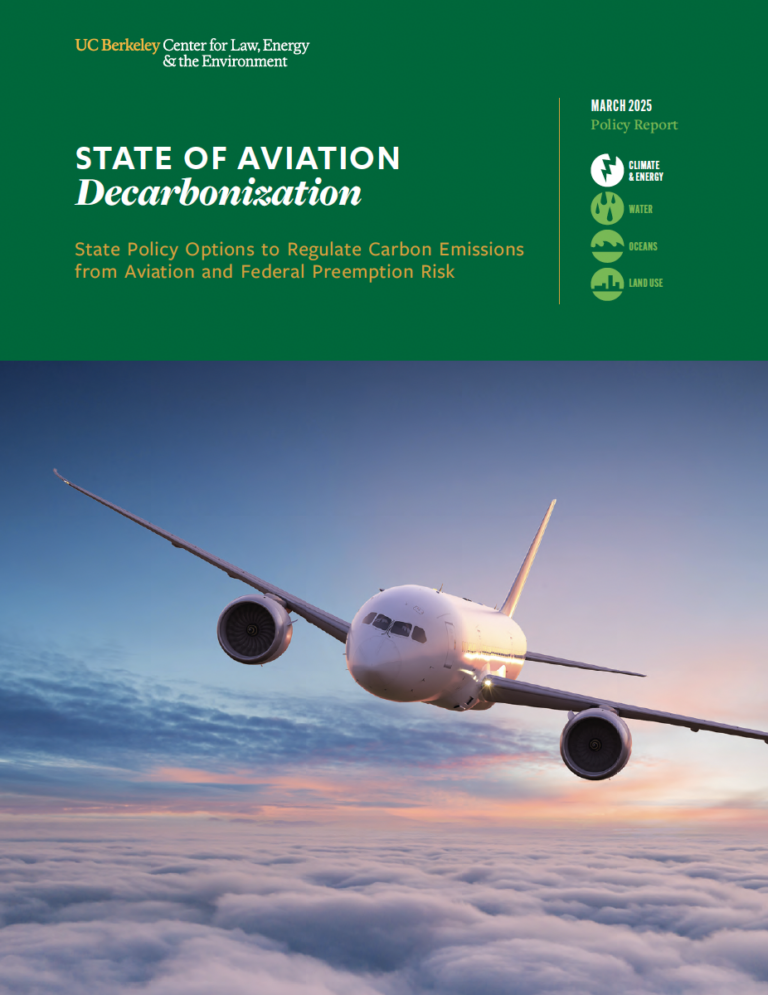
Aviation is a significant and growing source of greenhouse gas emissions. But the federal government in the United States has failed to address it so far. In response, some state policy makers are now considering legal avenues to effectively require the use of sustainable aviation fuels, which emit less carbon than traditional jet fuel when burned — and in some cases can eliminate these emissions altogether.
The report ultimately concludes that a low carbon fuel standard regulation would provide the greatest potential impact on sustainable aviation but entails the most legal risk among the three approaches, while increased taxation or fees on high-carbon jet fuel could have a potentially significant impact on sustainable aviation fuel if revenues support deployment of low-carbon alternatives, with a moderate risk of federal preemption.
Learn more about the State of Aviation Decarbonization.
A Policy Blueprint for Ensuring Sustainable Battery Supply Chains
 February 2025
February 2025
The rapid growth of electric vehicles (EVs)—from cars and trucks to buses and trains—places immense pressure on battery supply chains, beginning with mineral extraction and refining processes that have significant environmental and social impacts. While EVs are essential to reducing oil dependence and meeting global climate goals, consumer countries can develop policies to address these impacts.
Our new report provides a framework for building a more responsible battery supply chain. Drawing from the European Union’s Sustainable Batteries Regulation (2023), it outlines key challenges—from mining and refining to battery traceability and end-of-life management—and offers actionable recommendations for policymakers and industry leaders worldwide.
By drawing inspiration from the European Union’s Sustainable Batteries Regulation, jurisdictions worldwide can tailor and adopt this blueprint to address their specific contexts and challenges, thereby advancing the transition towards a greener and more sustainable future.
Learn more from the full Policy Blueprint.
2040 Sustainable Battery Vision: Global Forum for Sustainable Batteries
December 2024 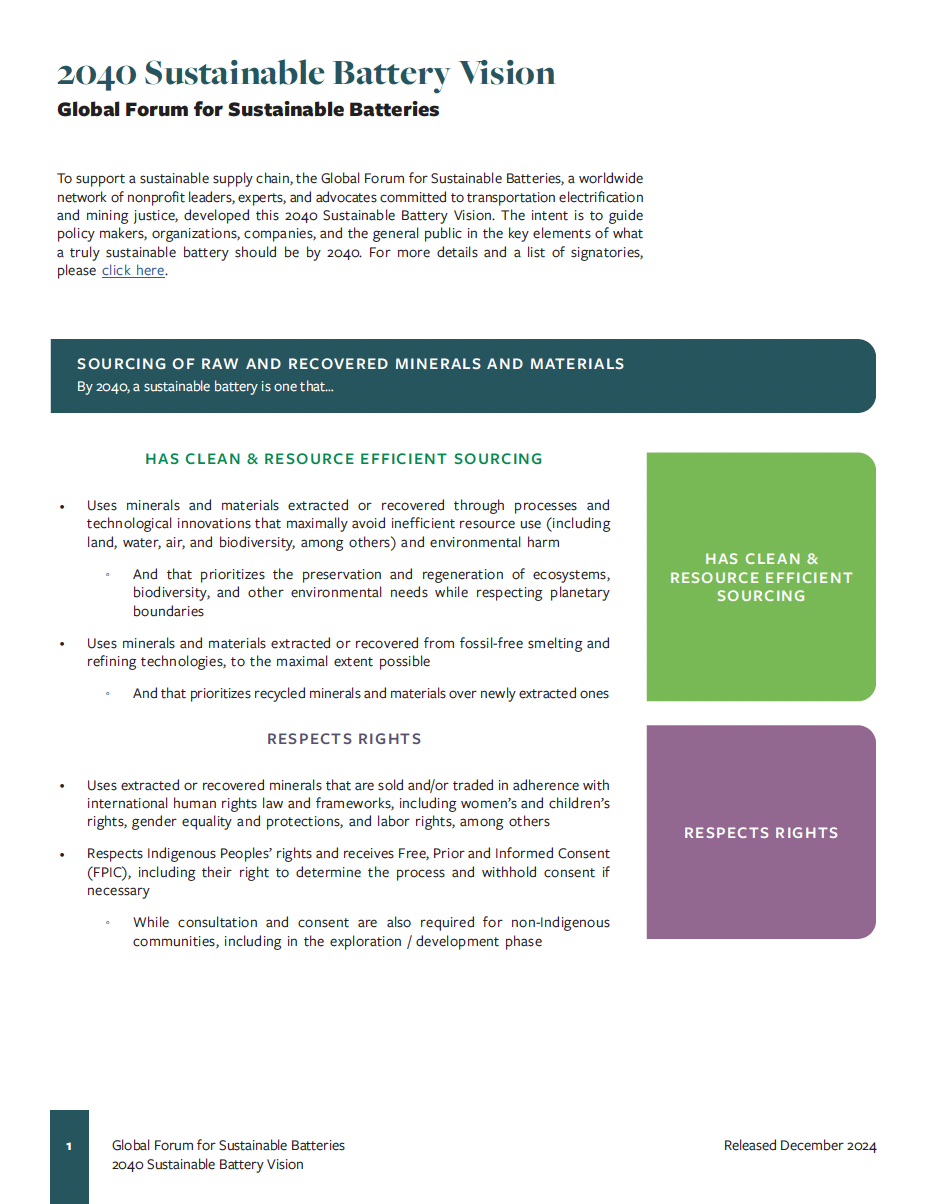
The effort to electrify transportation includes minerals like lithium, nickel, graphite, and cobalt. These and other minerals are too often mined and processed in ways that contribute to harming communities and ecosystems. The minerals used to build batteries for the electric buses, cars, trucks, and trains that help curb the climate crisis could instead be produced as sustainably as possible around the world, with ample community buy-in at each stage of the process.
If advocates, industry, stakeholders, and policy makers work together, they can avoid replicating past problems and injustices and can instead work to build a sustainable supply chain, powered by just mining practices, and strengthened by innovations that make efficient use – and reuse – of existing mineral resources, all while protecting the communities that will be central to the clean energy future.
To support this vision, Berkeley Law’s Center for Law, Energy and the Environment (CLEE) and ClimateWorks Foundation founded the Global Forum for Sustainable Batteries, a worldwide network of nonprofit leaders, experts, and advocates committed to transportation electrification and mining justice. In 2024, the Forum developed a 2040 Sustainable Battery Vision to guide policymakers, organizations, companies, and the general public in the key elements of what a truly sustainable battery should be by 2040. The 2040 Sustainable Battery Vision covers all aspects of the supply chain and beyond.
Learn more about the 2040 Sustainable Battery Vision.
Equitable EV Action Plan Framework
 December 2024
December 2024
The Equitable EV Action Plan Framework is designed to assist local governments and stakeholders in crafting EV and electrified mobility action plans to achieve transportation decarbonization through locally tailored, equity-focused strategies.
The Framework includes nationwide examples of best practices, ambitious policies, and innovative pilots across public and multifamily EV charging, shared and micromobility, funding and implementation, agency coordination, community engagement, and more.
Read the Framework: Equitable EV Action Plan Framework
 November 2024
November 2024
Each year, we reflect on CLEE’s mission and progress. Our 2024 Snapshot highlights our expanding efforts to help design, articulate, and share models for policy implementation.
As an independent academic center, CLEE takes a research-driven approach that prioritizes non-partisan, solutions-focused thinking. This independence allows us to support California and other jurisdictions with objective expertise—essential as regions worldwide look to California for environmental leadership. Known for being at the cutting edge, California collaborates with subnational governments globally to exchange knowledge, expertise, and vision. CLEE’s 2024 work has built on our experience working with the State of California and uniquely positioned us to contribute to its expanding global role in addressing the climate crisis.
Thank you for partnering with us at this critical moment. Please join us in celebrating our achievements and renewing our commitment to sustainable, equitable solutions.
Read this year’s annual report: CLEE 2024 Annual Snapshot
Reducing Financing Costs for New Transmission in California
 October 2024
October 2024
California will need a significant build-out of new high-voltage transmission lines to meet state goals for renewable energy deployment and a decarbonized grid by 2045, which requires a quadrupling of its current in-state solar and wind capacity. But if this new infrastructure is paid for solely through electricity rates, it could increase those rates significantly, which have already increased roughly 50% over the past three years for investor-owned utility customers.
In response, CLEE presents a policy report containing a variety of strategies available to policymakers for financing new high-voltage power transmission in California, with the dual goals of 1) reducing costs to ratepayers and 2) accelerating transmission development. The report was developed with the support of Net-Zero California and Clean Air Task Force.
Read the report: Improving Transmission Financing in California: Alternative Models and Policy Strategies to Increase Affordability
 October 2024
October 2024
Understanding the imperative for climate action, California has established a comprehensive framework for climate adaptation and resilience. This initiative is shaped by the California Climate Adaptation Strategy, the Integrated Climate Adaptation and Resilience Program (ICARP) in the Governor’s Office of Land Use and Climate Innovation (LCI), along with various sectoral and investment programs.
CLEE’s new report outlines recommendations for State Grant Program Administrators and State Policymakers on improving the funding landscape of State adaptation efforts.
Read the report: Bridging the Implementation Gap: Challenges and Opportunities for California’s Resilience Funding Landscape
Community Benefits Tools and California Clean Energy Projects
 October 2024
October 2024
Communities and governments at all levels are increasingly turning to community benefits tools to support an equitable climate transition, catalyze tangible and meaningful, long-term investments in community priorities, and achieve effective, durable projects. CLEE’s report provides an overview of policy drivers and tools that can be employed to deliver community benefits and outlines examples of successful Community Benefits Agreements, often considered the “gold standard” among various community benefits tools.
For additional structures that can promote community roles in equitable energy infrastructure deployment, such as participatory budgeting and community oversight councils, please see CLEE’s report, Facilitating Equity-Oriented EV Infrastructure Investments: Strategies for Project Design.
Read the report: Community Benefits Tools and California Clean Energy Projects
 October 2024
October 2024
As the national EV market is expected to grow nearly tenfold by 2030, state, federal, and private sector dollars are increasingly flowing into EV infrastructure across the U.S. However, charging investments have thus far faced significant barriers to equity. Current disparities in EV access risk further disenfranchising already underserved communities, impeding the widespread uptake of sustainable transportation options, and perpetuating patterns of mobility and environmental inequality.
This policy report presents three strategies for local governments and community-based organizations seeking to design equity-oriented EV infrastructure investments, including community oversight councils, Community Benefits Agreements, and participatory budgeting processes.
Read the report: Facilitating Equity-Oriented Electric Vehicle Infrastructure Investments: Strategies for Project Design
October 2024
To provide insurance to homeowners where private insurers decline to write insurance, 33 states have enacted laws creating Fair Access to Insurance Requirements (FAIR) plans which write insurance for homeowners otherwise unable to obtain private insurance. This policy brief proposes that the federal government establish a federal reinsurance program for state-level FAIR Plans to reduce the cost of purchasing private reinsurance for these plans. This reduction would help lower the cost of providing FAIR Plan insurance and enable FAIR Plans to access more reinsurance.
Read the policy brief: Federal Reinsurance for State FAIR Plans: A Policy Proposal to Assist State-Created Insurers of Last Resort
Electric Shared Mobility: California Lessons Learned for Equity in Program Design
 September 2024
September 2024
Shared mobility—an umbrella term for sharing transportation among multiple passengers—has the potential to accelerate transportation electrification, air quality, and greenhouse gas reduction goals, meet the needs of underserved communities that most lack mobility access, and further broaden mobility equity policy goals. CLEE’s new report highlights examples of shared mobility programs and identifies lessons learned for equity-focused electric vehicle (EV) program design based on analysis of California projects in two key categories: EV carshare and mobility hubs.
Read the report: Electric Shared Mobility: California Lessons Learned for Equity in Program Design
Fueling & Financing: Addressing the Urgent Challenges Facing Electric Heavy-Duty Vehicle Deployment
August 2024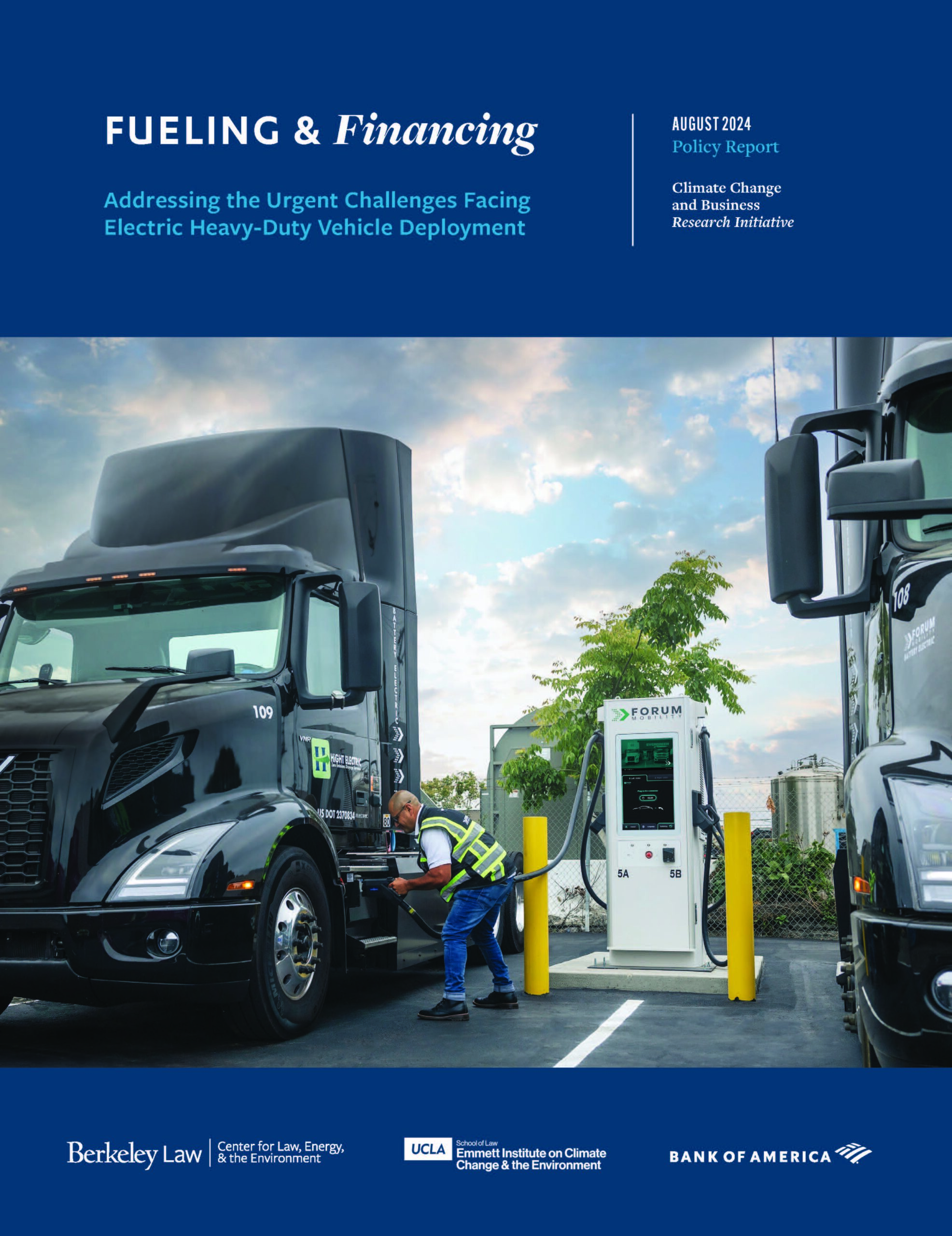
Heavy-duty vehicles, such as large semi-trucks and buses, disproportionately contribute to harmful air pollution, particularly in low-income and disadvantaged communities. They also emit significant greenhouse gases, exacerbating climate change. Fortunately, zero-emission electric versions of these vehicles are on the road today and increasingly available. However, the infrastructure required to support these vehicles is immense. The California Energy Commission estimates that by 2030, the state will need 114,500 chargers to support the anticipated 155,000 medium- and heavy-duty electric trucks and buses.
To address these dual needs of infrastructure and financing, CLEE and the UCLA Law Emmett Institute on Climate Change and the Environment convened experts and stakeholders to help identify the most pressing barriers both to deploying more charging infrastructure and to unlocking more private financing for both electric vehicles and the infrastructure on which they rely, as well as the solutions to overcome those barriers.
Read the report: Fueling & Financing: Addressing the Urgent Challenges Facing Electric Heavy-Duty Vehicle Deployment
Policy Strategies to Promote Equitable EV Charging Access for Multifamily Housing Residents
August 2024 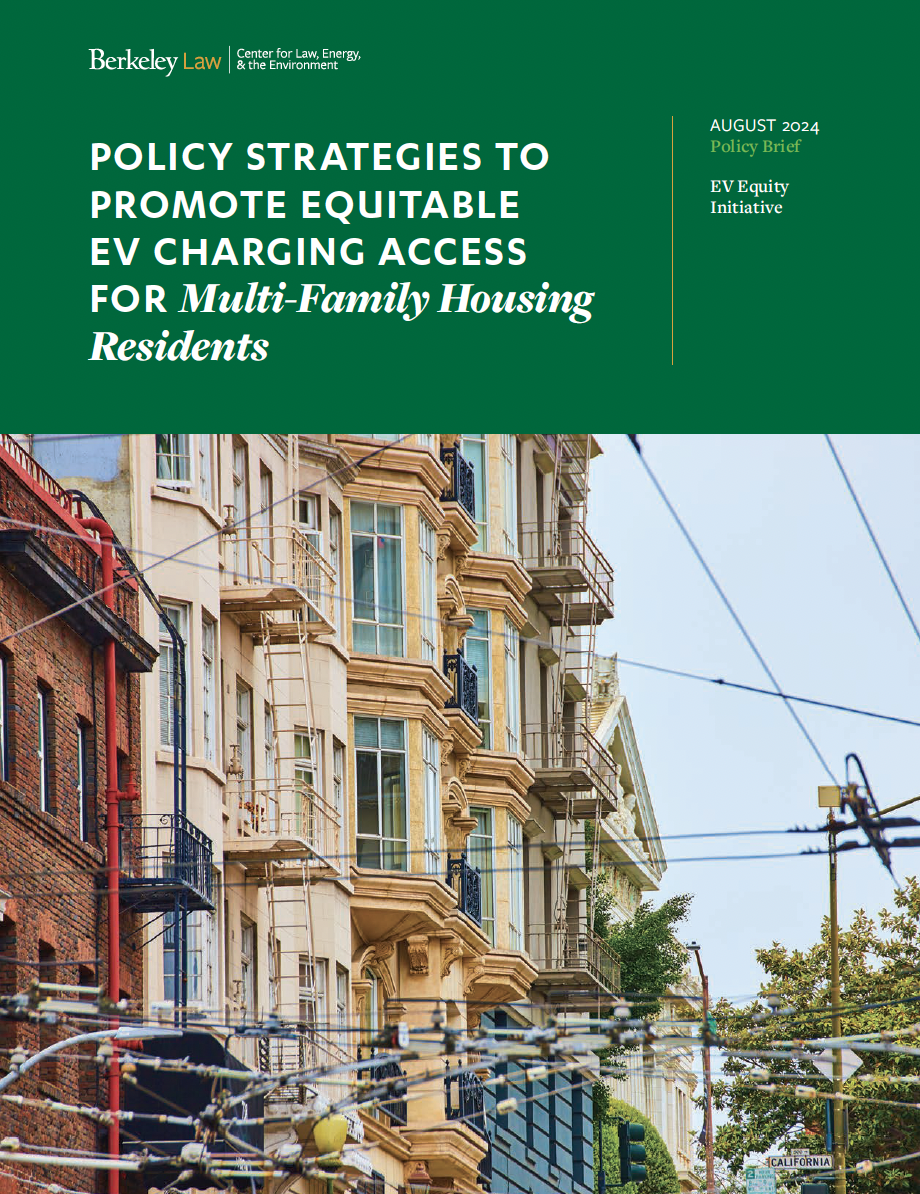
The rapidly approaching electric vehicle (EV) transition that California and 12 other states have committed to enact over the coming decade mounts pressure on state and local governments to deliver millions of new EV chargers across various location types. Homes constitute the core of a convenient and reliable charging network, and EV charging infrastructure in multifamily housing and multi-unit dwellings (MUDs) in particular, will serve a vital role in ensuring an equitable clean mobility transition.
The current lack of electric vehicle charging at MUDs limits the ability of their residents – particularly in lower-income and dense urban communities – to access the health and financial benefits of this clean technology. Our new report, informed by interviews with program officials and multifamily residential charging experts, draws from city programs and existing case studies to identify equity-oriented solutions to key MUD charging barriers.
Read the report: Policy Strategies to Promote Equitable EV Charging Access for Multifamily Housing Residents
Advancing Climate Adaptation: Findings from California’s Adaptation Planning Grant Program
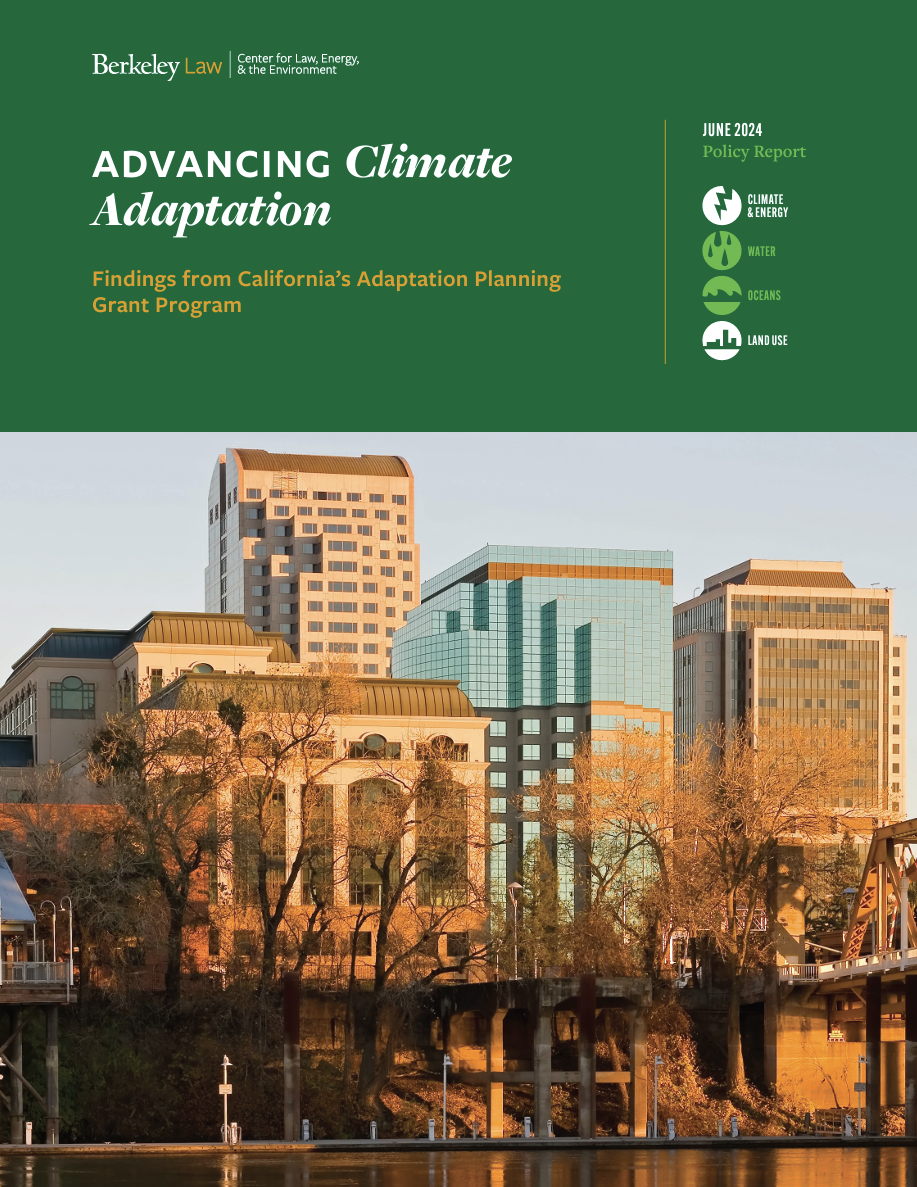 June 2024
June 2024
Building resilience to climate risks requires investment in adaptation, or a series of actions intended to anticipate, mitigate, and adjust to the challenges posed by warming conditions. The Integrated Climate Adaptation and Resiliency Program (ICARP) at the Governor’s Office of Planning and Research (OPR) administers the Adaptation Planning Grant Program (APGP). APGP provides funding to address local, regional, and tribal planning needs, equips communities with the resources to identify climate resilience priorities, and supports the development of planning-to-implementation project pathways across the state.
CLEE’s new report provides an initial assessment of the first round of APGP, including a review of adaptation funding literature, a landscape analysis of State programs facilitating local and regional adaptation actions, an analysis of program engagement and award data, and interviews with the 14 program grantees, as well as four grantee case studies.
Read the report: Advancing Climate Adaptation Capacity: Findings from California’s Adaptation Planning Grant Program
May 2024 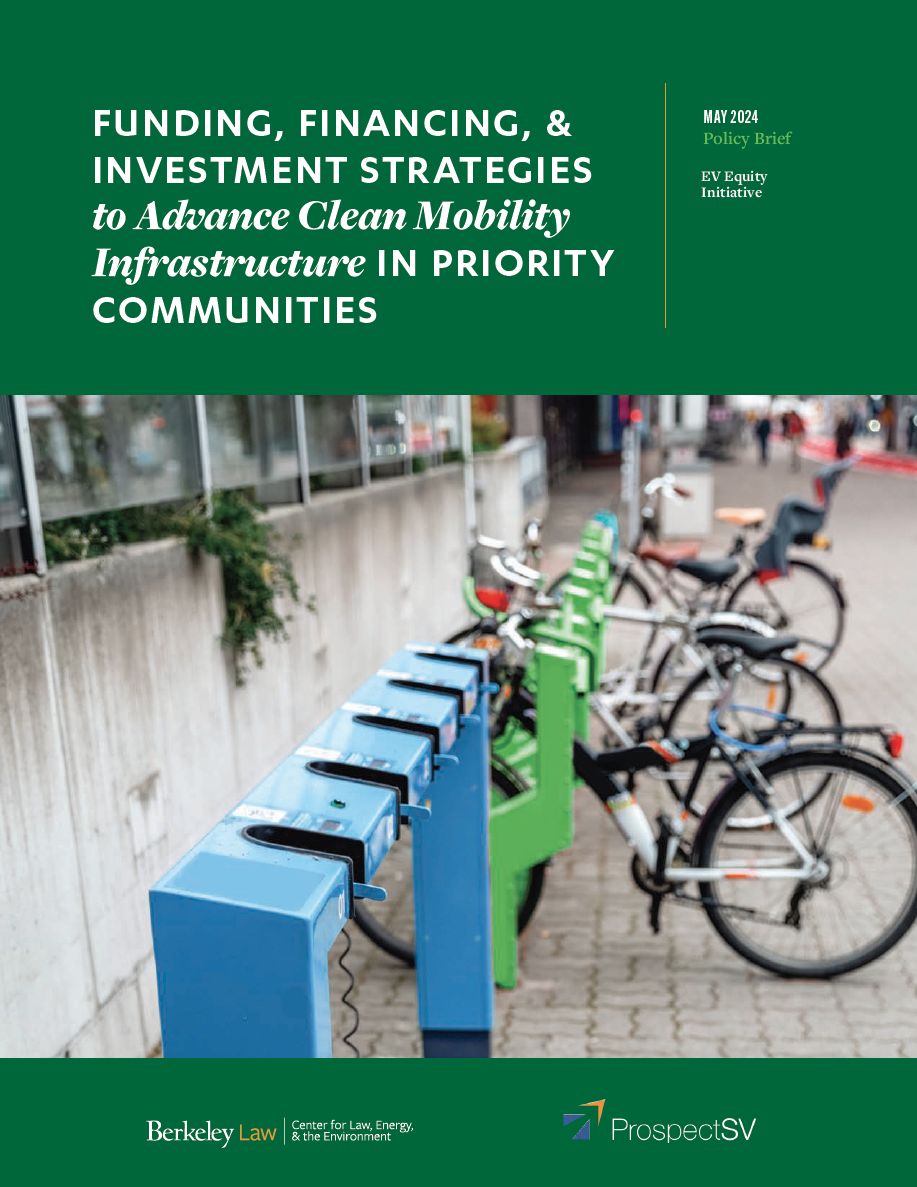
The transition to 100 percent zero-emission vehicle (ZEV) sales by 2035 will require massive investment in electric vehicle charging infrastructure throughout California and in other states that have adopted the same phaseout targets. Ensuring that California’s priority populations are included in and benefit from the ZEV transition in a timely manner will rely heavily on proactive strategies that deliver equitable access to public charging infrastructure.
As part of our joint Equitable Mobility Initiative, CLEE and Prospect Silicon Valley convened an advisory group of experts in climate and public finance, clean mobility, and city infrastructure investment to develop innovative proposals to address this challenge. Our resulting report outlines the top financing and revenue strategies identified by the group to bring city-scale and mobility infrastructure solutions to fruition.
Read the report: Funding, Financing, & Investment Strategies to Advance Clean Mobility Infrastructure in Priority Communities
Scoping the Public Health Impacts of Wildfire: A Primer for Stakeholders
May 2024 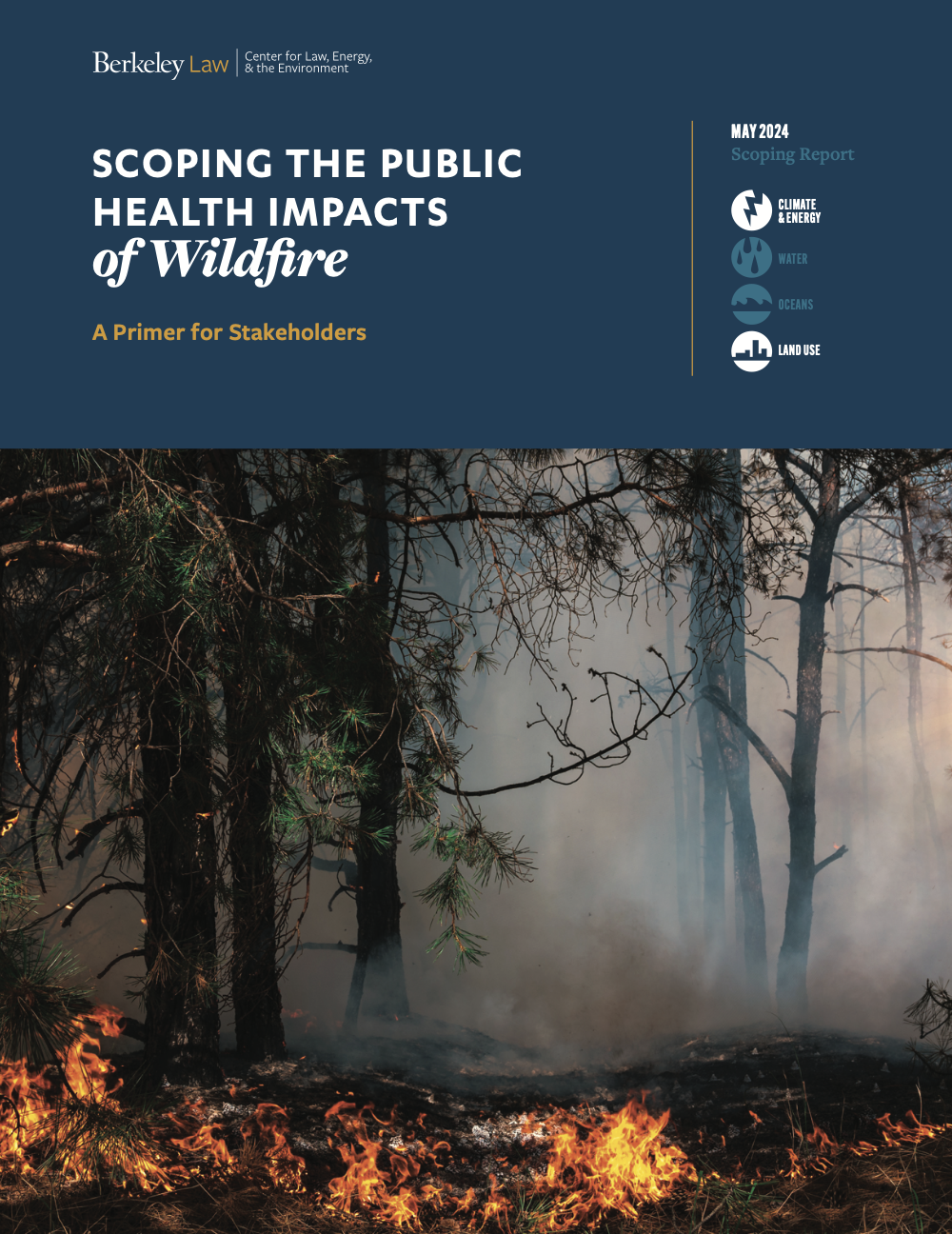
Wildfire smoke presents a population-wide health risk in California. At the same time, the policy landscape addressing this issue remains siloed on the state and federal level, posing challenges to integrated policy development and implementation.
This scoping report, in partnership with the Climate & Wildfire Institute, offers a primer for stakeholders interested in the intersections of wildland fire and public health. The report investigates key issues in the physical and mental health impacts of wildfire, provides an overview of the current state and federal policy landscape, and presents recommendations for future resilience.
Read the report: Scoping the Public Health Impacts of Wildfire: A Primer for Stakeholders
Offshore Wind & Community Benefits Agreements in California: CBA Examples
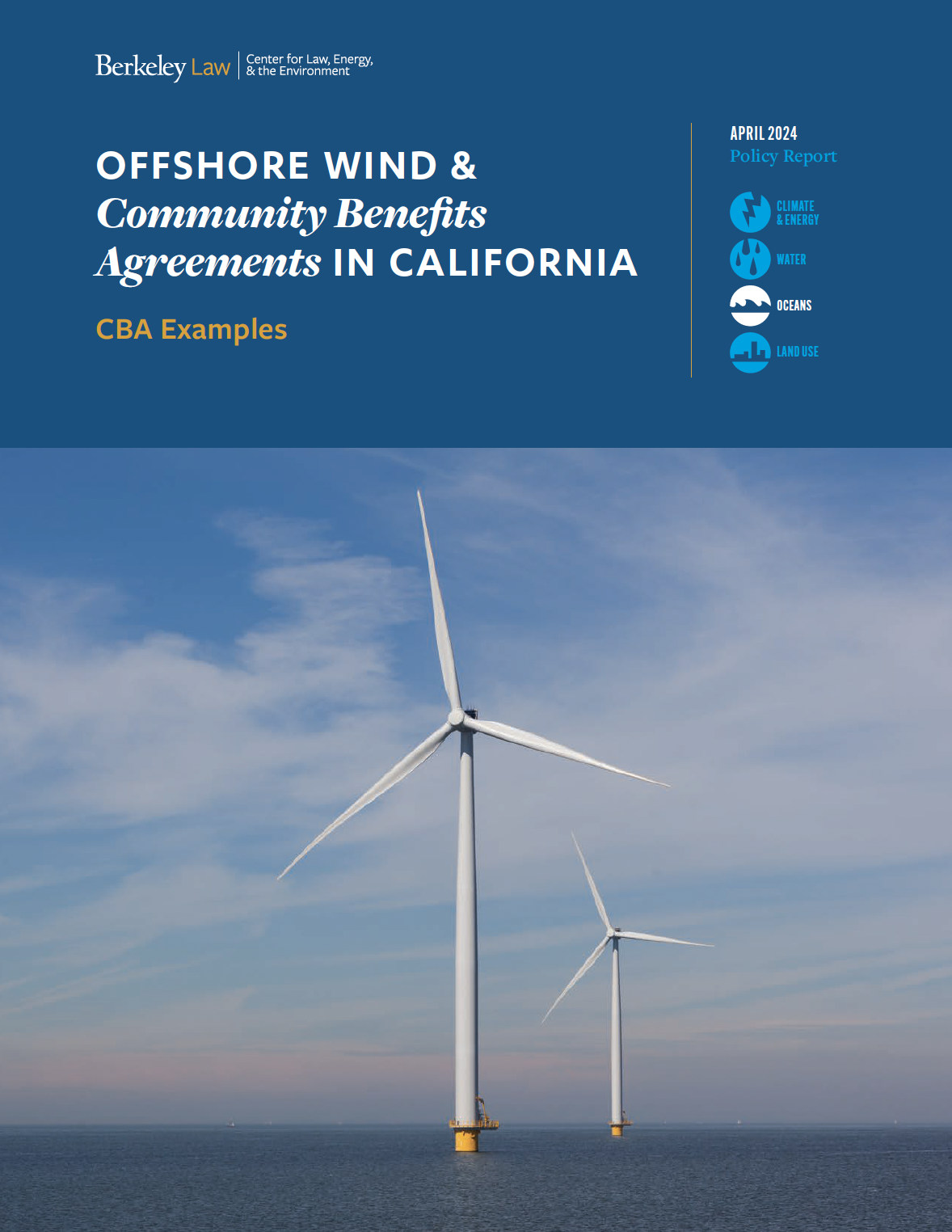 April 2024
April 2024
California’s goal of achieving 25 gigawatts of offshore wind electricity by 2045 will help the State meet its carbon neutrality target and will also have transformative effects on the State’s economy and communities. Community Benefits Agreements (CBAs) are tools that can enable local communities to have a voice in the development of new projects and ensure that the state’s transition to offshore wind creates sustainable, equitable economic opportunity, and local investment.
CLEE’s report, Offshore Wind & Community Benefits Agreements in California: CBA Examples, highlights the community-oriented measures and CBAs in California’s existing offshore wind leases and presents select CBA examples and community benefits provisions from the real estate and manufacturing sectors, as well as from east coast and UK wind farm projects.
Read the report: Offshore Wind & Community Benefits Agreements in California: CBA Examples
Watch the Lunch & Learn Webinar: California Offshore Wind & Community Benefits Agreements: CBA Examples Webinar
Case Studies: City Public & Curbside Charging Strategies
March 2024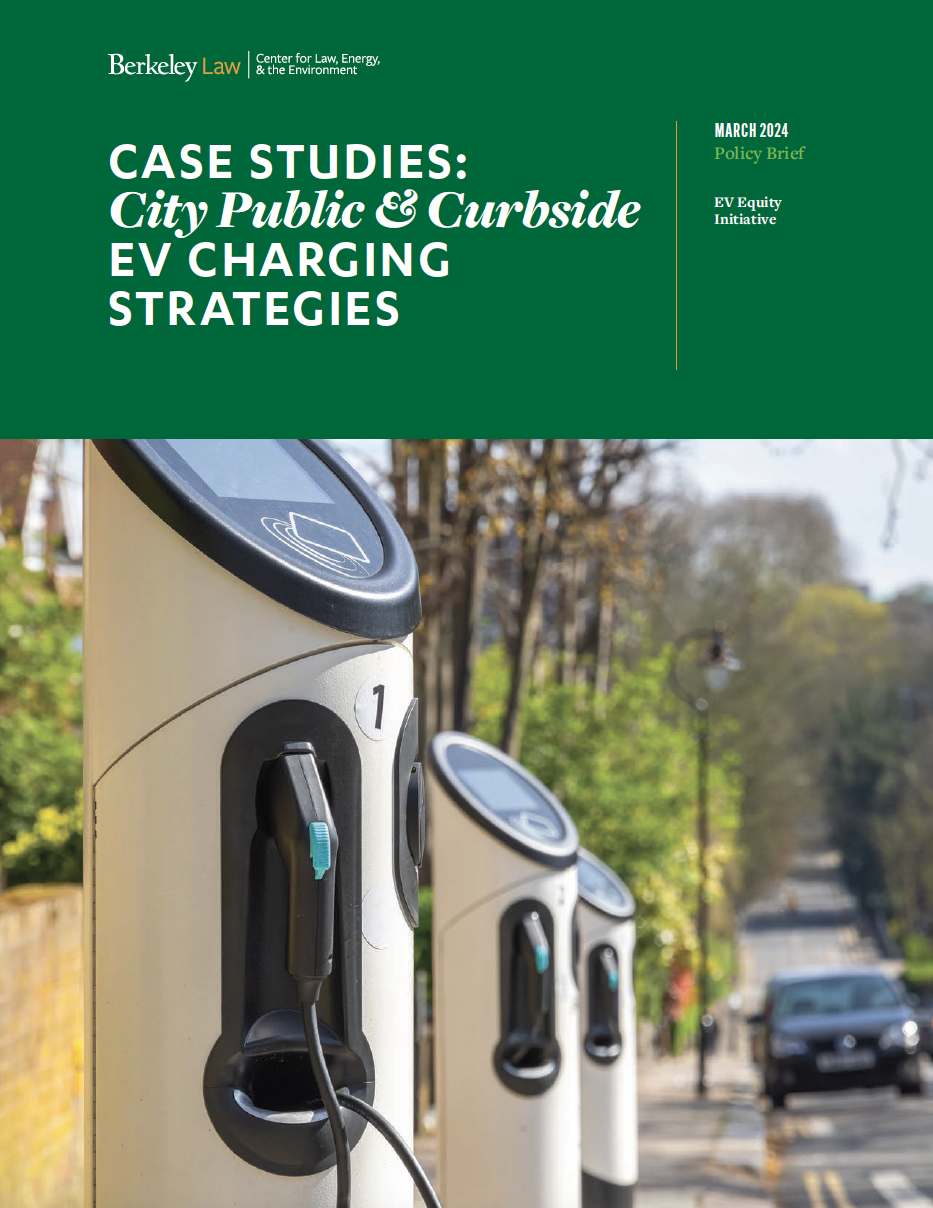
As California and other states transition to one hundred percent zero-emission new vehicle (ZEV) sales by 2035, local governments will play a crucial role in addressing inequities in the ZEV transition. Curbside and public right-of-way (PROW) locations are a key venue for city governments to lead electric vehicle (EV) infrastructure development and deliver a more equitable charging network for residents.
Our case study report, informed by interviews with city leaders and EV charging project directors, gathers insights from city programs that are leading efforts to expand charging infrastructure in the PROW.
Read the report: Case Studies: City Public & Curbside Charging Strategies
California’s 2021 Year in Fire: Fire and Resilience Impacts Beyond Acres Burned
February 2024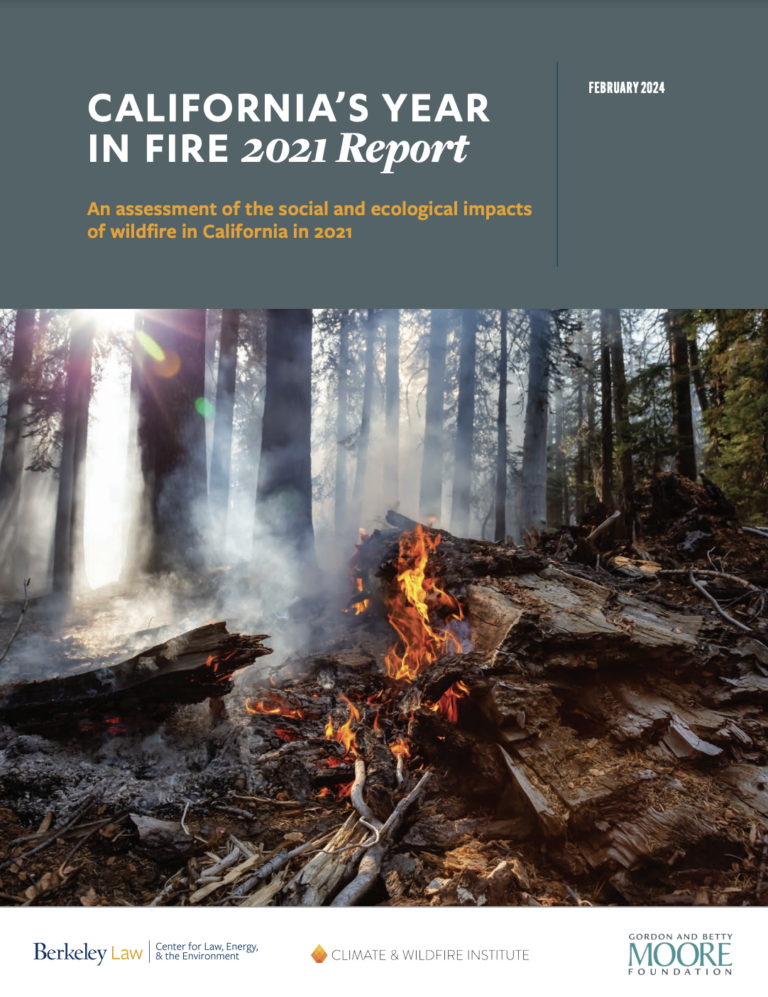
How are wildfires impacting California, and how are those impacts evolving? A wide variety of wildfire impacts are either not tracked or not reported, thereby limiting our ability to make informed decisions in wildfire mitigation and recovery efforts.
The California’s Year in Fire project, in partnership with the Climate & Wildfire Institute and the Gordon and Betty Moore Foundation, advances a framework for a more complete picture of evolving impacts and consequences, and provides more robust data points to inform meaningful solutions.
Read the report: California’s 2021 Year in Fire: Fire and Resilience Impacts Beyond Acres Burned
January 2024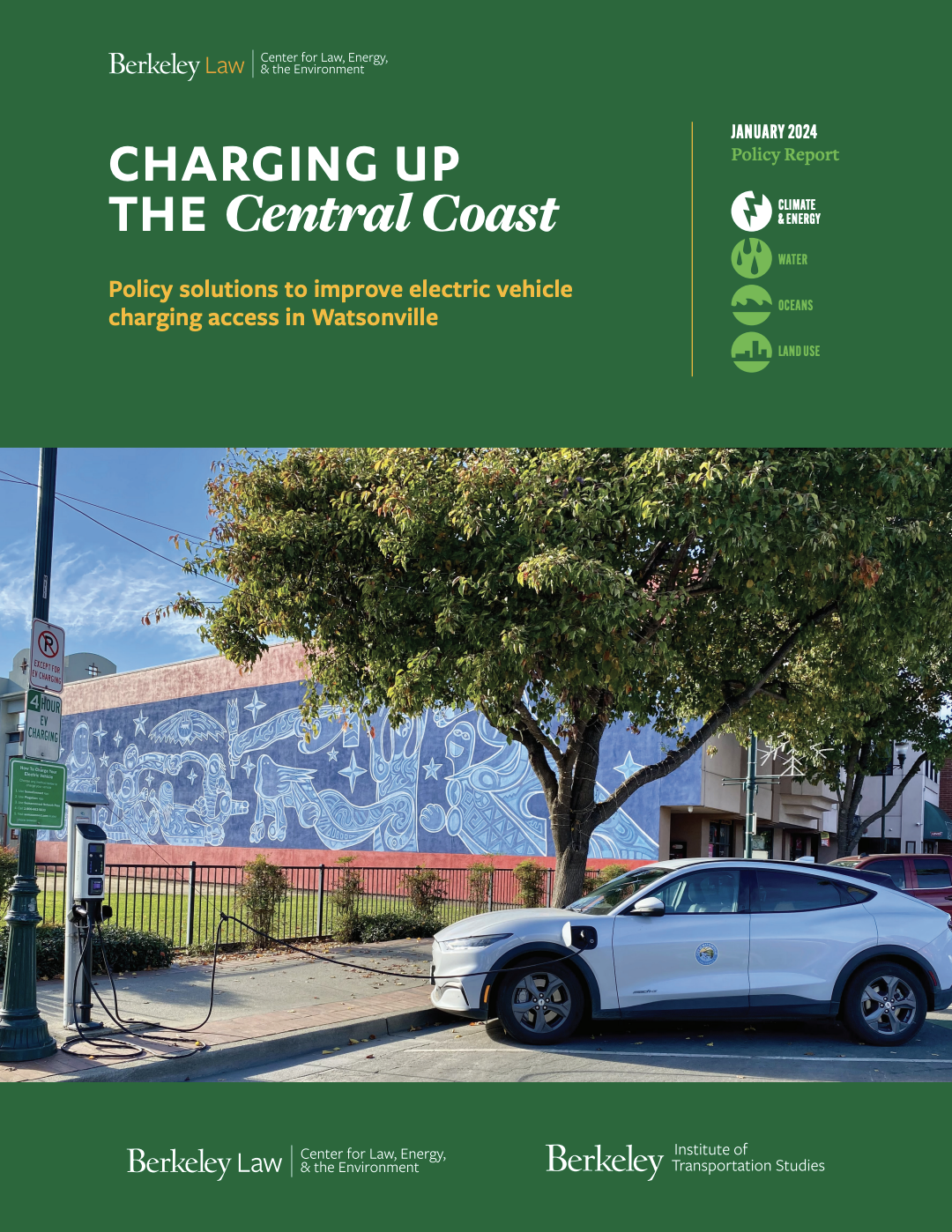
California’s goal to eliminate internal combustion engine sales by 2035 poses challenges for lower- and moderate-income residents, hindering their access to electric vehicles (EVs). Barriers include limited EV charging stations, exacerbated by lower home ownership and inadequate grid infrastructure in lower-income communities.
To address this, CLEE partnered with the City of Watsonville. Due to its location, demographics, and ambitious policy goals, Watsonville represents a potential model and case study for other cities around the state grappling with how to boost EV charging infrastructure. CLEE conducted stakeholder interviews and a convening in Watsonville in May 2023, and developed a set of policy recommendations for both state and local entities to accelerate investment in EV charging infrastructure in Watsonville, which could inform other cities facing similar challenges and seeking to meet state targets and residents’ needs.
Read the report: Charging up the Central Coast: Policy solutions to improve electric vehicle charging access in Watsonville
January 2024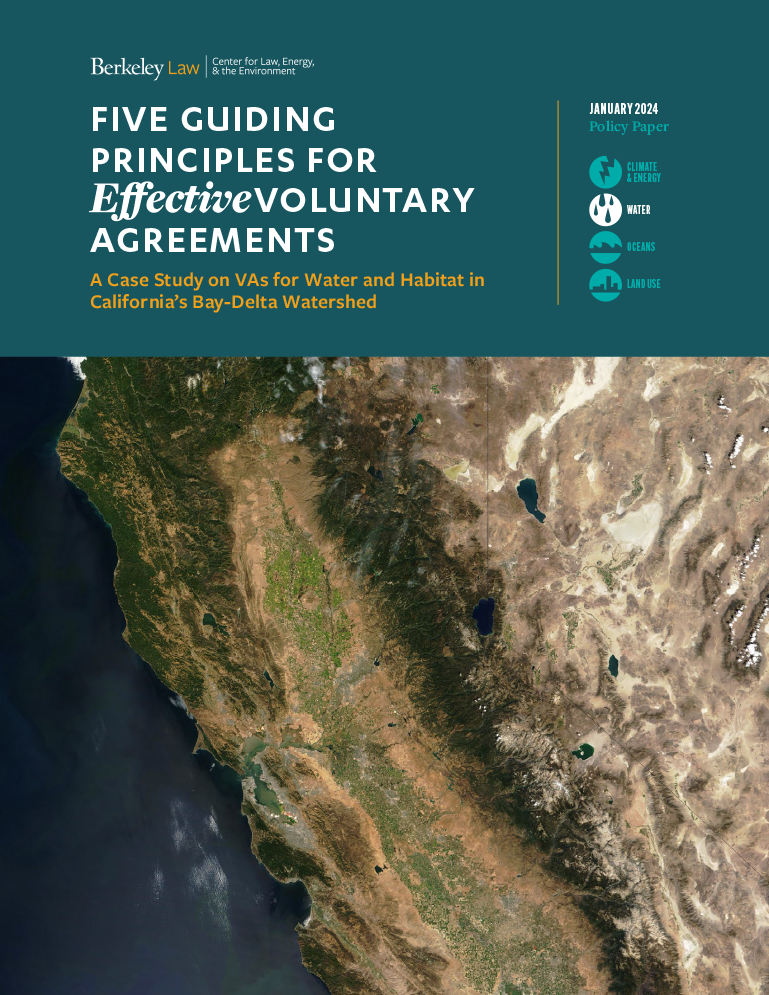
California has increasingly emphasized efforts to develop voluntary agreements (VAs) with water users as a means of achieving regulatory goals in certain watersheds. In theory, a VA can combine the protectiveness of a regulatory backstop with the creativity and flexibility of a negotiated deal to produce outcomes as good as, or better than, those achievable through strict application of regulatory requirements alone. However, reality has not always measured up to this ideal. This policy paper uses the Bay-Delta watershed as a case study to inform five principles to guide the appropriate use and evaluation of VAs.
Read the report: Five Guiding Principles for Effective Voluntary Agreements: A Case Study on VAs for Water and Habitat in California’s Bay-Delta Watershed










